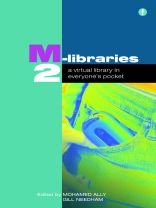Interest in m-library services has grown exponentially in the last five years, as libraries are recognizing the potential of ubiquitous and increasingly sophisticated mobile devices. Building on the highly regarded M-Libraries: libraries on the move to provide virtual access, this new book brings together research and case studies from all corners of the globe on the development and delivery of library services and content to mobile devices. Based on the proceedings of the Second International M-Libraries Conference held in Vancouver, this new collection of contributions from authorities in the field serves to demonstrate the ingenuity and creativity of developers and service providers in this area, ranging from the innovative application of basic mobile phone technology to provide information services in remote parts of the globe lacking internet access, to the development of new tools and technologies which harness the full functionality of popular mobile phones. This title includes topics such as: enhancing library access through the use of mobile technology; the university library digital reading room; mobile access for workplace and language training; the role of an agent supplying content on mobile devices; cyberlearning and reference services via mobile devices; podcasting as an outreach tool; service models for information therapy services delivered to mobiles; bibliographic ontology and e-books; health literacy and healthy action in the connected age; a collaborative approach to support flexible, blended and technology-enhanced learning; and, mobilizing the development of information skills for students on the move and in the workplace. This collection demonstrates the emergence of an evidence base for m-libraries, with a number of contributions presenting the results of user surveys and studies of user behaviour. This highly topical book should be read by information professionals in all sectors, and by policy makers, researchers, developers, publishers and suppliers. It will also be of great interest to library and information studies students and newcomers to the profession.
قائمة المحتويات
Foreword – Sir John Daniel Introduction – Mohamed Ally PART 1: M-LIBRARIES: DEVELOPMENTS AROUND THE WORLD 1. Where books are few: the role of mobile phones in the developing world – Ken Banks 2. Mobile technology in Indian librarie – Parveen Babbar and Seema Chandhok 3. Mobile technologies and their possibilities for the library, University of the South Pacific (USP) – Elizabeth C. Reade Fong 4. M-library in an m-university: changing models in the Open University of Catalonia – Dora Pérez and Pep Torn 5. Piloting mobile services at University of Houston Libraries – Karen A. Coombs, Veronica Arellano, Miranda Bennett, Robin Dasler and Rachel Vacek PART 2: TECHNOLOGY IN M-LIBRARIES 6. Evolution of modern library services: the progression into the mobile domain – Damien Meere, Ivan Ganchev, Máirtín Ó’Droma, Mícheál Ó’h Aodha and Stanimir Stojanov 7. Bibliographic ontology and e-books – Jim Hahn 8. QR codes and their applications for libraries: a case study from the University of Bath Library – Kate Robinson 9. A tale of two institutions: collaborative approach to support and develop mobile library services and resources – Hassan Sheikh and Tony Tin 10. Designing a mobile device automatic detector to support mobile library systems – Yang Guangbing, Tony Tin, Colin Elliott, Maureen Hutchison and Rory Mc Greal 11. The Athabasca University Library Digital Reading Room: an i Phone prototype implementation – Rory Mc Greal, Hongxing Geng, Tony Tin and Darren James Harkness PART 3: APPLICATION OF M-LIBRARIES 12. Mobile access for workplace and language training – Mohamed Ally, Tracey Woodburn, Tony Tin and Colin Elliott 13. Service models for information therapy services delivered to mobiles – Vahideh Z. Gavgani 14. Health literacy and healthy action in the connected age – Paul Nelson and Bob Gann 15. ‘Ask us upstairs’: bringing roaming reference to the Paley stacks – Fred Rowland and Adam Shambaugh 16. The role of an agent supplying content on mobile devices – Jose Luis Andrade 17. Portable science: podcasting as an outreach tool for a large academic science and engineering library – Eugene Barsky and Kevin Lindstrom PART 4: M-LIBRARIES AND LEARNING 18. Mobilizing the development of information skills for students on the move and for the workplace: two case studies of mobile delivery in practice – Hassan Sheikh and Anne Hewling 19. The library’s place in a mobile space – Graham Mc Carthy and Sally Wilson 20. M-libraries in distance education: a proposed model for IGNOU – Seema Chandhok and Parveen Babbar 21. Bridging the mobile divide: using mobile devices to engage the X and Y generations – Phil Cheeseman and Faye Jackson 22. Information literacy gets mobile – Peter Godwin 23. Library and Student Support (L&SS): flexible, blended and technology-enhanced learning – Victoria Owen PART 5: BUILDING THE EVIDENCE BASE FOR M-LIBRARIES 24. Enhancing library access through the use of mobile technology: case study of information services provided by six mobile companies in Bangladesh – Nafiz Zaman Shuva 25. M-libraries: information use on the move – Keren Mills 26. UCLA and Yale Science Libraries data on cyberlearning and reference services via mobile devices – Brena Smith, Michelle Jacobs, Joseph Murphy and Alison Armstrong 27 Say what? An SMS transcript analysis at New York University – Alexa Pearce, Scott Collard and Kara Whatley Conclusion – Gill Needham and Nicky Whitsed.
عن المؤلف
Professor Mohamed Ally BSc Ma Ph D is Director of the Centre for Distance Education, Athabasca University, Canada. Gill Needham BA (Hons) Dip Lib Cert Man MSc (Econ) is Associate Director, Information Management and Innovation at the Open University Library and Learning Resources Centre, UK.












